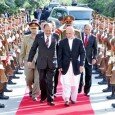By Wajahat Ali –
The new secretary will have his ‘pivot to Asia’ task cut out as well as restore faith in U.S. diplomacy
President Barack Obama emphasized the idea of “nation-building” at home during his election campaign last year. He knew that the American voter was more concerned about domestic challenges than foreign policy issues and, therefore, decided to expend a chunk of his time and energy to discuss internal issues such as tax policies, healthcare reforms and vanishing employment opportunities.
The focus of his campaigns and the mood in the United States made many analysts believe that he would be focusing on domestic politics more than anything else in his second term.
However, Obama is not likely to reduce his country’s external engagements, especially in this era of global instability and turbulence when Washington’s threat perception has reached monumental proportions.
The Middle East will not disappear from the map simply because the U.S. is facing an economic crunch; the war in Afghanistan will require intense American attention since the world is, at best, limping towards an end game in that country; Iran will continue to make the U.S. administration more nervous since its nuclear programme is thought to be making rapid progress; and China will persist to be viewed as an assertive power by the American policymakers as Washington pursues its “pivot to Asia” policy.
All this implies that the American international engagements are likely to increase in the coming months. The U.S. may not initiate new wars (though it will be imprudent to rule out limited conflict in Iran). However, its officials are likely to indulge in economic diplomacy to address some of the outstanding domestic challenges since the new U.S. administration will find it difficult to get things right at home without working with other international actors.
Secretary of State
It is against this backdrop that President Obama’s decision to name the next captain of the American diplomatic ship held such keen interest worldwide.
Secretary of State Hillary Clinton had announced last year that she wanted to get a breather “after 20 years of being on the high-wire of American politics”. Since then, there has been much speculation about who is going to replace her in President Obama’s second term.
This is not surprising. The top State Department post is one of the most important cabinet positions in the U.S. and has been traditionally occupied by some of the most high-profile individuals in that country. Many of these people have also played a major role in the international arena and, in some cases, have left a deep imprint on world history.
For instance, George C. Marshall, who occupied this position in January 1947, is still remembered for presenting an ambitious plan to rebuild Europe. His European Recovery Programme — better known as the Marshall Plan — helped Washington’s allies on the other side of the Atlantic to modernize their economies and make a quick financial recovery.
Similarly, John Foster Dulles, who became the state secretary in 1953, was one of those individuals who set the tone for the Cold War era. Serving the Eisenhower administration, he took an aggressive view of communism and built the North Atlantic Treaty Organization to counter it.
It is true that despite their privileged position all secretaries of state have to vie for influence within the cabinet. Cyrus Vance, who served the Carter administration and wanted to establish economic ties with the Soviet Union, frequently quarreled with the hawkish national security advisor, Zbigniew Brzezinski. Vance lost a major battle to his nemesis when the Red Army invaded Afghanistan and the U.S. pondered its options in response to that development.
Brzezinski’s hard-line approach resulted in a protracted conflict and, in subsequent years, gave rise of militant Islamist networks in and around Afghanistan.
It is also true that sometimes American presidents overlook the advice of their state secretaries. For instance, George Marshall was not in favour of the idea of recognizing Israel since he thought it would be detrimental to peace and stability in the Middle East. However, President Harry Truman went ahead and gave his blessings to the Jewish state.
New nominations
Despite such challenges, it is a huge milestone for policymakers and politicians to be at the helm of affairs at the State Department. President Obama initially wanted to bestow this honour on his country’s ambassador to the United Nations, Susan Rice. However, his choice was bitterly criticized by leading Republican Senators who said that they were unhappy with her public statement about the September 11 attack on US consulate in Benghazi.
Rice had described the assault on the U.S. mission as a “spontaneous reaction” to an anti-Islam film that was distributed through the Internet and resulted in mass protests across the Muslim world.
The Obama administration later changed tack, however, and described the violent act as a premeditated terror attack.
As the U.S. envoy to the United Nations dropped out of the race, Senator John Kerry was billed as the secretary of state in waiting. Kerry has been working as the Chairman of Senate Foreign Relations Committee and understands the intricacies of his country’s international engagements. However, if his nomination comes through, he will have to leave his Senate seat, and that may put his party in a bit of a quandary.
Kerry may not have Hillary Clinton’s persona. However, as a former presidential candidate, he is likely to be taken seriously by other states and stands a good chance of advancing the strategic objectives of his state abroad. His appointment may not be a bad thing for Pakistan since he has previously tried to broaden and deepen U.S. relationship with Islamabad.
He is one of the architects of the Enhanced Partnership with Pakistan Act of 2009 which is more popularly known as the Kerry-Lugar-Berman Act. The bill sought to add greater value to the relationship between the two countries which has traditionally remained centered on their defence and security requirements.
It became a law in October 2010 and was designed to support grassroots organizations in Pakistan that were focusing on development activities to benefit the ordinary people.
Nevertheless, it is hard to see how Kerry’s appointment as state secretary will change the American policy in this region since the U.S. has already determined its game plan to a large extent in the Af-Pak territory.
Kerry will face two major challenges if he occupies the top slot at the State Department. First, he will have to breathe a new life into the Obama administration’s “pivot to Asia” policy. Besides, he will need to restore the faith of American citizens in their country’s diplomatic abilities.
The U.S. habitually applies military solution to foreign policy problems. This has not done any good to its economy in the last one decade and created a number of domestic issues that have finally come to haunt the American government and people.
It is not easy to say if the new U.S. state secretary will abandon his country’s coercive military and diplomatic tactics and indulge in more benign international engagements that can redound to the advantage of American citizens.
However, it is certainly the goal that everyone working in this position will have to keep in mind in the coming years.
The writer is a journalist with keen interest in foreign policy issues and based in Islamabad































































































